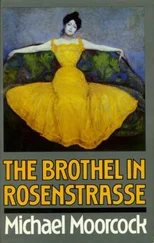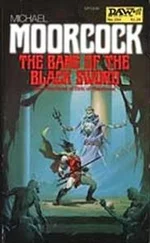Michael Moorcock - Behold the Man
Здесь есть возможность читать онлайн «Michael Moorcock - Behold the Man» весь текст электронной книги совершенно бесплатно (целиком полную версию без сокращений). В некоторых случаях можно слушать аудио, скачать через торрент в формате fb2 и присутствует краткое содержание. Жанр: Фантастика и фэнтези, на английском языке. Описание произведения, (предисловие) а так же отзывы посетителей доступны на портале библиотеки ЛибКат.
- Название:Behold the Man
- Автор:
- Жанр:
- Год:неизвестен
- ISBN:нет данных
- Рейтинг книги:5 / 5. Голосов: 1
-
Избранное:Добавить в избранное
- Отзывы:
-
Ваша оценка:
- 100
- 1
- 2
- 3
- 4
- 5
Behold the Man: краткое содержание, описание и аннотация
Предлагаем к чтению аннотацию, описание, краткое содержание или предисловие (зависит от того, что написал сам автор книги «Behold the Man»). Если вы не нашли необходимую информацию о книге — напишите в комментариях, мы постараемся отыскать её.
Behold the Man — читать онлайн бесплатно полную книгу (весь текст) целиком
Ниже представлен текст книги, разбитый по страницам. Система сохранения места последней прочитанной страницы, позволяет с удобством читать онлайн бесплатно книгу «Behold the Man», без необходимости каждый раз заново искать на чём Вы остановились. Поставьте закладку, и сможете в любой момент перейти на страницу, на которой закончили чтение.
Интервал:
Закладка:
Pilate was a stout man. His face was self-indulgent and his eyes were hard and shallow. He looked disdainfully at the Jew.
"We do not pay informers whose information is proved to be false," be warned.
"I do not seek money, lord," said Judas, feigning the ingratiating manner that the Romans seemed to expect of the Jews. "I am a loyal subject of the Emperor."
"Who is this rebel?"
"Jesus of Nazareth, lord. He entered the city today..."
"I know. I saw him. But I heard he preached of peace and obeying the law."
"To deceive you, lord." Pilate frowned. It was likely. It smacked of the kind of deceit he had grown to anticipate in these soft-spoken people.
"Have you proof?"
"I am one of his lieutenants, lord. I will testify to his ~ guilt." Pilate pursed his heavy lips. He could not afford to offend the Pharisees at this moment. They had given him enough trouble. Caiaphas, in particular, would be quick to cry "injustice" if he arrested the man.
"He claims to be the rightful king of the Jews, the descendant of David," said Judas, repeating what his master had told him to say.
"Does he?" Pilate looked thoughtfully out of the window.
"As for the Pharisees, lord..."
"What of them?"
"The Pharisees distrust him. They would see him dead. He speaks against them." Pilate nodded. His eyes were hooded as he considered this information. The Pharisees might hate the madman, but they would be quick to make political capital out of his arrest.
"The Pharisees want him arrested," Judas continued. "The people flock to listen to the prophet and today many of them rioted in the Temple in his name."
"Is this true?"
"It is true, lord." It was true. Some half-a-dozen people had attacked the money-changers in the Temple and tried to rob them. When they had been arrested, they had said they had been carrying out the will of the Nazarene.
"I cannot make the arrest," Pilate said musingly. The situation in Jerusalem was already dangerous, but if they were to arrest this "king," they might find that they precipitated a revolt. Tiberius would blame him, not the Jews. The Pharisees must be won over. They must make the arrest.
"Wait here," he said to Judas. "I will send a message to Caiaphas." And they came to a place which was named Gethsemane: and he saith to his disciples. Sit ye here, while I shall pray.
And he takes with him Peter and James and John, and began to be sore amazed, and to be very heavy; And saith unto them. My soul is exceeding sorrowful unto death: tarry ye here, and watch. (Mark 14:32-34) Glogauer could see the mob approaching now. For the first time since Nazareth he felt physically weak and exhausted. Tfiev were going to kill him. He had to die; he accepted that, buil he was afraid of the pain that was to come.
He sat down to the ground of the hillside, watching the torches as they came closer.
"The ideal of martyrdom only ever existed in the minds of a few ascetics," Monica had said. "Otherwise it was morbid masochism, an easy way to forgo ordinary responsibility, a method of keeping repressed people under control..."
"It isn't as simple as that..."
"It is, Kari." He could show Monica now. His regret was that she was unlikely ever to know. He had meant to write everything down and put it into the time machine and hope that it would be recovered. It was strange. He was not a religious man in the usual sense. He was an agnostic. It was not conviction that had led him to defend religion against Monica's cynical contempt for it; it was rather lack of conviction in the ideal in. which she had set her own faith, the ideal of science as a solver of all problems. He could not share her faith and there was nothing else but religion, though he could not believe in the kind of God of Christianity. The God seen as a mystical force of the mysteries of Christianity and other great religions had not been personal enough for him. His rational, mind had told him that God did not exist in any personal form. His unconscious had told him that faith in science was not enough.
"Science is basically opposed to religion," Monica had once said harshly. "No matter how many Jesuits get together and rationalize their views of science, the fact remains that religion cannot accept the fundamental attitudes of science and it is implicit to science to attack the fundamental principles of religion. The only area in which there is no difference and need be no war is in the ultimate assumption. One may or may not assume there is a supernatural being called God.
But as soon as one begins to defend one's assumption, there must be strife."
"You're talking about organized religion..."
"I'm talking about religion as opposed to a belief. Who needs the ritual of religion when we have the far superior ritual of science to replace it? Religion is a reasonable substitute for knowledge. But there is no longer any need for substitutes, Karl. Science offers a sounder basis on which to formulate systems of thought and ethics. We don't need the..." carrot of heaven and the big stick of hell any more when science can show the consequences of actions and men can judge easily for themselves whether those actions are right or wrong."
"I can't accept it."
"That's because you're sick. I'm sick, too, but at least I can see the promise of health"
"I can only see the threat of death..." As they had agreed, Judas kissed him on the cheek and the mixed force of Temple guards and Roman soldiers surrounded him.
To the Romans he said, with some difficulty, "I am the King of the Jews." To the Pharisees' servants be said: "I am the messiah who has come to destroy your masters." Now he was committed and the final ritual was to begin.
It was an untidy trial, an arbitrary mixture of Roman and Jewish law which did not altogether satisfy anyone. The object was accomplished after several conferences between Pontius Pilate and Caiaphas and three attempts to bend and merge their separate legal systems in order to fit the expediencies of the situation. Both needed a scapegoat for their different purposes and so at last the result was achieved and the madman convicted, on the one hand of rebellion against Rome and on the other of heresy.
A peculiar feature of the trial was that the witnesses were all followers of the man and yet had seemed eager to see him convicted.
The Pharisees agreed that the Roman method of execution would fit the time and the situation best in this case and it was decided to crucify him. The man had prestige, however, so that it would be necessary to use some of the tried Roman methods of humiliation in order to make him into a pathetic and ludicrous figure in the eyes of the pilgrims. Pilate assured the Pharisees that he would see to it, but he made sure that they signed documents that gave their approval to his actions.
And the soldiers led him away into the hall, called Praetorium; an Alhey call together the whole band. And they clothed him with purple, and platted a crown of thorns, and put it about his head. And began to salute him. Hail, King of the Jews! And they smote him on the head with a reed, and did spit upon him, and bowing their knees worshipped him. And when they had mocked him, they took off the purple from him, and put his own clothes on him, and led him out to crucify him.
(Mark 15:16-20)VII
His brain was clouded now, by pain and by the ritual of humiliation; by his having completely given himself up to his r61e.
He was too weak to bear the heavy wooden cross and he walked behind it as it was dragged towards Golgotha by a Cyrenian whom the Romans had press-gauged for the purpose.
As he staggered through the crowded, silent streets, watched by those who had thought he would lead them against the Roman overlords, his eyes filled with tears so that his sight was blurred and he occasionally staggered off the road and was nudged back onto it by one of the Roman guards.
Читать дальшеИнтервал:
Закладка:
Похожие книги на «Behold the Man»
Представляем Вашему вниманию похожие книги на «Behold the Man» списком для выбора. Мы отобрали схожую по названию и смыслу литературу в надежде предоставить читателям больше вариантов отыскать новые, интересные, ещё непрочитанные произведения.
Обсуждение, отзывы о книге «Behold the Man» и просто собственные мнения читателей. Оставьте ваши комментарии, напишите, что Вы думаете о произведении, его смысле или главных героях. Укажите что конкретно понравилось, а что нет, и почему Вы так считаете.









